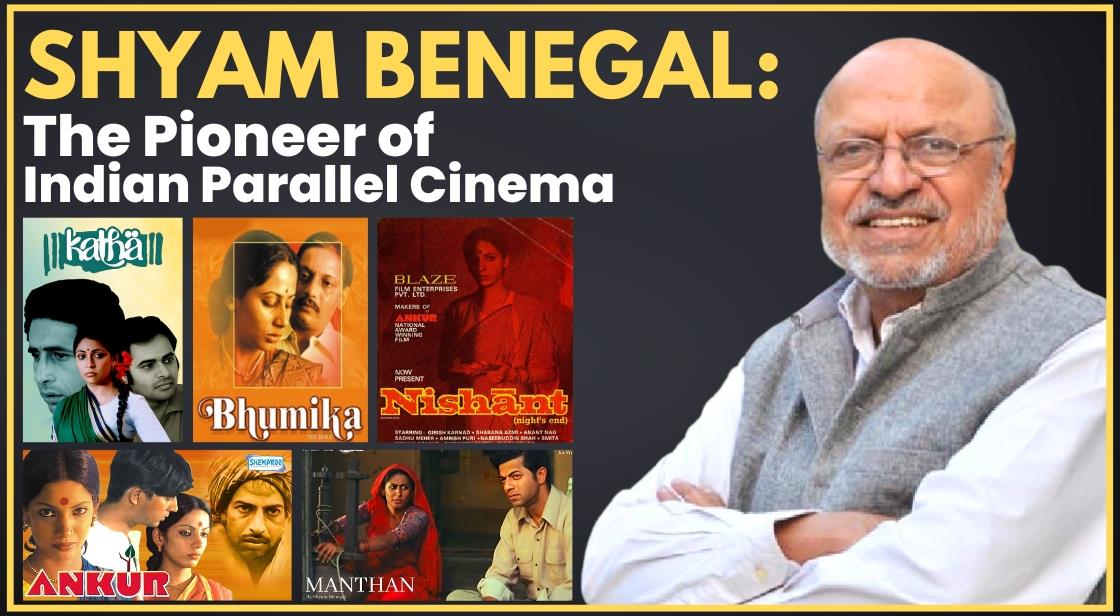Shyam Benegal: The Pioneer of Indian Parallel Cinema

Blog Post
Shyam Benegal (1934–2024) stands as one of the most revered figures in Indian cinema, celebrated for his groundbreaking work in Indian Parallel Cinema. Known as a master storyteller of social realism, Benegal brought to life the struggles, triumphs, and complexities of ordinary people, often marginalized or overlooked by mainstream narratives.
Benegal’s career, which began in the 1970s, marked a shift in Indian filmmaking during an era dominated by commercial Bollywood productions. His films, characterized by their authenticity, socially relevant themes, and minimalist style, addressed critical issues such as caste dynamics, gender inequality, and rural empowerment. Through masterpieces like Ankur, Nishant, Manthan, and Bhumika, he redefined storytelling and inspired a movement that sought to use cinema as a medium for social change.
Beyond his creative achievements, Benegal’s influence extended into mentoring future generations of filmmakers and actors, urging them to explore meaningful and transformative narratives. His work earned him numerous accolades, including eighteen National Film Awards, the Dadasaheb Phalke Award, and India’s Padma Shri and Padma Bhushan honors.
Even after his passing in 2024, Shyam Benegal’s legacy lives on as a symbol of courage, artistry, and the power of cinema to provoke thought and inspire change. This blog delves into the life, career, and lasting contributions of this cinematic pioneer, whose work continues to resonate with audiences worldwide
Shyam Benegal: The Storyteller of Social Realism
Shyam Benegal (December 14, 1934 – December 23, 2024) was a renowned Indian filmmaker, screenwriter, and documentary filmmaker. He is often regarded as the pioneer of Indian Parallel Cinema, a movement that brought realism and social issues to the forefront of Indian cinema.
Benegal's filmmaking career began in the early 1970s, a time when Indian cinema was largely dominated by commercial, formulaic Bollywood films. He stood out with his realistic and socially conscious films that addressed pressing social issues, reflected the struggles of the marginalized, and depicted the complexities of human relationships. His films often featured non-professional actors and were characterized by their authenticity and depth.
Role in Indian Parallel Cinema
Shyam Benegal is widely regarded as a pioneer of Indian Parallel Cinema, a movement that emerged as an alternative to mainstream Bollywood. This movement was characterized by its focus on realistic storytelling, artistic expression, and social relevance. Benegal's debut film, "Ankur" (1974), is considered a landmark in this genre. The film, which explores themes of caste, power dynamics, and social injustice, received critical acclaim and established Benegal as a visionary director.
His subsequent films, such as "Nishant" (1975), "Manthan" (1976), and "Bhumika" (1977), further cemented his reputation. These films not only received national and international acclaim but also addressed a wide range of social issues, including women's rights, labor exploitation, and rural development.
Shaping Socially Conscious Cinema
The importance of Shyam Benegal's work in shaping socially conscious cinema in India cannot be overstated. Through his films, Benegal highlighted the plight of the underprivileged, questioned societal norms, and provoked thought and dialogue. His storytelling was rooted in Indian socio-political realities, and he used cinema as a medium to reflect and critique these realities.
Benegal's work paved the way for future generations of filmmakers to explore themes of social justice, human rights, and cultural identity. His commitment to authenticity and his willingness to tackle difficult subjects have left an indelible mark on Indian cinema, inspiring filmmakers to use their craft as a tool for social change.
Shyam Benegal's legacy continues to influence contemporary Indian cinema, reminding us of the power of film to reflect society and inspire transformation.
Early Life and Education of Shyam Benegal
Shyam Benegal was born on December 14, 1934, in Trimulgherry, Secunderabad, Hyderabad, during the British colonial era. His father, Sridhar B. Benegal, was a professional photographer, a profession that exposed young Shyam to the world of visual arts and sparked his early fascination with storytelling through images. This creative environment played a pivotal role in shaping his cinematic perspective.
Benegal pursued his Master’s degree in Economics from Osmania University in Hyderabad. During his time at the university, he founded the Hyderabad Film Society, a platform that brought together cinema enthusiasts and served as an incubator for his burgeoning passion for films. This society allowed him to explore and discuss a variety of film styles and genres, laying the groundwork for his future as a filmmaker deeply rooted in realism and social themes.
Initial Interest in Cinema and Storytelling
Benegal's fascination with storytelling began in his formative years. He was drawn to the rich narratives of Indian mythology and folklore, which he encountered through books, local theater, and films. His admiration for legendary filmmakers like Satyajit Ray and Vittorio De Sica further fueled his passion for cinema. As a student, he began experimenting with photography and filmmaking, producing his first amateur film, The Charge of the Light Brigade, at the age of 12.
Professional Journey in Advertising and Influence on Filmmaking
Benegal started his professional career in the advertising industry, working at Lintas (now Lowe Lintas). Here, he honed his skills in visual storytelling, scripting, and directing commercial advertisements. This period allowed him to develop a keen eye for realism and attention to detail, which became hallmarks of his films. Advertising also provided him with access to filmmaking technology and a network of creative professionals, setting the stage for his transition into cinema.
This multifaceted background laid the foundation for Shyam Benegal’s illustrious career as a filmmaker who championed socially relevant storytelling.
Career Beginnings of Shyam Benegal
Shyam Benegal began his professional journey as a copywriter at Lintas Advertising in Mumbai, one of India’s leading advertising agencies. His creativity and dedication saw him quickly rise through the ranks to become the creative head of the organization. During this period, he directed over 900 commercials and documentaries, which provided him with extensive experience in visual storytelling.
These advertisements and short films allowed Benegal to experiment with narrative techniques, visual framing, and audience engagement, skills that became integral to his filmmaking style. His work in advertising also provided him access to technology and connections within the media industry, which facilitated his transition into cinema.
Pioneering Indian Parallel Cinema of Shyam Benegal
Benegal made his directorial debut with Ankur (1974), a film that became a cornerstone of the Indian Parallel Cinema movement. This groundbreaking film tackled themes of caste, power dynamics, and societal oppression, resonating deeply with audiences and critics alike. The realistic portrayal of rural India and the struggles of its people established Benegal as a visionary director.
Building on the success of Ankur, Benegal directed a series of films that defined his legacy in Indian cinema. Films like Nishant (1975), Manthan (1976), and Bhumika (1977) delved into complex social issues such as gender inequality, rural empowerment, and human relationships. These films were marked by their authentic storytelling, minimalist approach, and a cast of non-professional actors who brought a raw and genuine quality to the screen.
Manthan, in particular, was notable for its innovative production model, funded through small contributions from 500,000 farmers. This community-funded approach symbolized the collective effort that Benegal championed in his work.
Shyam Benegal’s Films: A Deep Dive into Indian Parallel Cinema
Introduction to Shyam Benegal’s Filmmaking Style
Shyam Benegal is synonymous with the Indian Parallel Cinema movement. His films are characterized by their realism, social consciousness, and exploration of societal issues. Unlike mainstream Bollywood, Benegal’s films focus on authentic storytelling, using real-life situations, unembellished visuals, and complex character studies.
Ankur (1974): The Dawn of Parallel Cinema
Benegal's directorial debut, Ankur (1974), is often considered the defining moment in the rise of Indian Parallel Cinema. The film tells the story of a young man’s oppression due to the caste system and explores themes of power, inequality, and rural life. The film was lauded for its bold portrayal of social issues and its naturalistic style.
Nishant (1975): Power, Corruption, and Social Injustice
Shyam Benegal’s Nishant (1975) delves into the corrupt power structures of rural India. It explores themes of feudalism, exploitation, and the plight of women, focusing on a man’s struggle to seek justice for the wrongs done to his wife. The film’s portrayal of rural life is raw, shedding light on the social injustices faced by the underprivileged.
Manthan (1976): A Revolution in Rural India
Manthan (1976) is a film that signifies the power of collective action and rural empowerment. The story is about the dairy farmers' cooperative movement and the challenges faced in setting up a co-op in a rural village. The film was groundbreaking in its production, as it was funded by 500,000 farmers, embodying the spirit of community and social change.
Bhumika (1977): The Struggles of Women and Identity
Bhumika (1977) explores the complexities of female identity and the emotional and psychological struggles of a woman, played by Shabana Azmi, in a patriarchal society. The film portrays her journey from a child star in theater to an adult actress navigating societal and familial constraints, making it an important commentary on the changing roles of women in post-independence India.
Katha (1983): Ordinary Lives, Extraordinary Choices
Katha (1983) is a light-hearted yet poignant exploration of the lives of two middle-class men, focusing on themes of loneliness, love, and unfulfilled desires. The film's simplicity and portrayal of everyday struggles made it a standout in Benegal’s career, showcasing his ability to delve into the complexities of human emotions with subtlety.
Contributions and Legacy of Shyam Benegal
Shyam Benegal’s films consistently focused on social justice, human rights, and the struggles of marginalized communities. He was renowned for his ability to tell stories with authenticity and empathy, often using real-life situations as inspiration. His narrative style, characterized by naturalistic performances and unembellished visuals, set a benchmark for Indian cinema.
Benegal’s influence extended beyond his own work. He mentored a new generation of filmmakers and actors, encouraging them to address relevant societal issues through their art. By challenging conventional storytelling methods and focusing on content over commercial appeal, he inspired a wave of socially conscious cinema in India.
Awards and Honors of Shyam Benegal
Shyam Benegal’s exceptional contributions to Indian cinema were recognized through a plethora of prestigious awards. Among his accolades, he received an impressive eighteen National Film Awards, highlighting the consistent critical acclaim his films garnered over the years. These awards celebrated his ability to craft narratives that were both socially relevant and artistically profound.
Recognition at Filmfare Awards
Apart from his success at the National Film Awards, Benegal also won a Filmfare Award, a testament to his widespread recognition within the mainstream film industry. This award further solidified his position as a master storyteller and a pioneer in Indian cinema.
Dadasaheb Phalke Award: The Ultimate Honor
In 2005, Benegal was bestowed with the Dadasaheb Phalke Award, India’s highest honor in cinema. This lifetime achievement award recognized his enduring contributions to the industry and his unparalleled influence on Indian filmmaking.
Padma Shri and Padma Bhushan Awards
Shyam Benegal’s influence extended beyond cinema into the cultural fabric of India. For his outstanding contributions to the arts, he was honored with the Padma Shri in 1976 and the Padma Bhushan in 1991. These civilian awards underscored his impact as a visionary artist who used cinema as a medium for social change.
A Testament to Socially Conscious Storytelling
Each of these accolades not only celebrated his cinematic brilliance but also recognized his unwavering commitment to addressing pressing social issues through his films, cementing his legacy as a true pioneer of Indian cinema.
Passing and Legacy of Shyam Benegal
Shyam Benegal passed away on December 23, 2024, at the age of 90, after battling chronic kidney disease. His passing marked the end of an era, but his legacy continues to inspire filmmakers and audiences alike.
Benegal’s films remain a testament to his dedication to realistic cinema and his desire to shed light on the lives of ordinary people. His pioneering efforts in Indian Parallel Cinema continue to influence contemporary filmmakers, ensuring that his contributions to Indian cinema are celebrated for generations to come.
Shyam Benegal’s life and work epitomize the power of cinema to reflect society’s truths and challenge its injustices, making him a true pioneer and a revered figure in Indian cinema.
Conclusion: Shyam Benegal's Enduring Legacy
Shyam Benegal was more than a filmmaker; he was a visionary who used cinema to reflect societal realities and challenge entrenched norms. His pioneering efforts in Indian Parallel Cinema brought forth a new wave of socially conscious storytelling, making him a beacon of authenticity and depth in an era dominated by commercialism.
Through his films, Benegal highlighted the struggles of the marginalized, questioned societal injustices, and explored the complexities of human relationships. His dedication to realism and his ability to provoke thought through powerful narratives have left an indelible mark on Indian cinema.
The numerous awards and honors he received, including the Dadasaheb Phalke Award and the Padma Bhushan, stand as a testament to his unparalleled contributions to art and culture. Even after his passing, his work continues to inspire filmmakers to create meaningful cinema that reflects and transforms society.
Shyam Benegal’s legacy is not just etched in the annals of Indian cinema but also in the hearts of audiences who find his films as relevant today as they were decades ago. His life and work serve as a reminder of the profound impact cinema can have in fostering dialogue, understanding, and change.
You May Like
EDITOR’S CHOICE












